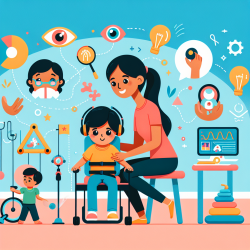As practitioners in the field of pediatric rehabilitation, we continuously seek ways to enhance the quality of life for children with cerebral palsy (CP). A recent study, "Factors for changes in self-care and mobility capabilities in young children with cerebral palsy involved in regular outpatient rehabilitation care," provides valuable insights that can guide our clinical practices. Here, we explore the study's findings and their implications for improving therapeutic outcomes.
Key Findings from the Study
The study analyzed longitudinal data from 90 children with CP, using the Paediatric Evaluation of Disability Inventory (PEDI). The results revealed several factors significantly associated with changes in self-care and mobility capabilities:
- Age: Older children showed more significant improvements in both self-care and mobility capabilities.
- Gross Motor Function Classification System (GMFCS) Levels: Children with lower GMFCS levels (I-III) showed gradual improvements, while those with higher levels (IV-V) reached their maximum capabilities earlier.
- Intellectual Impairment: Intellectual impairment was a significant factor limiting improvements in self-care capabilities.
Implications for Practice
Understanding these factors allows us to tailor our therapeutic approaches more effectively. Here are some actionable steps based on the study's findings:
1. Individualized Goal Setting
Given that children with more severe CP reach their maximum capabilities earlier, setting realistic goals is crucial. For these children, maintaining their current level of function may be more achievable than further improvement.
2. Early Intervention
The significant association between age and improvement underscores the importance of early intervention. Starting therapy as early as possible can maximize the potential for improvement in self-care and mobility.
3. Focus on Intellectual Development
Since intellectual impairment significantly impacts self-care capabilities, incorporating cognitive development strategies into therapy can be beneficial. This holistic approach can lead to better overall outcomes.
Encouraging Further Research
While the study provides valuable insights, it also highlights the need for further research. Specifically, exploring the impact of other factors such as therapy intensity, family involvement, and social support could provide a more comprehensive understanding of what drives improvements in self-care and mobility.
Conclusion
By integrating the findings from this study into our clinical practices, we can make data-driven decisions that enhance the quality of life for children with CP. Continuous monitoring and individualized care plans are essential for achieving the best possible outcomes.To read the original research paper, please follow this link:
Factors for changes in self-care and mobility capabilities in young children with cerebral palsy involved in regular outpatient rehabilitation care.










